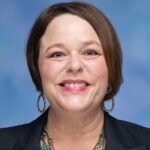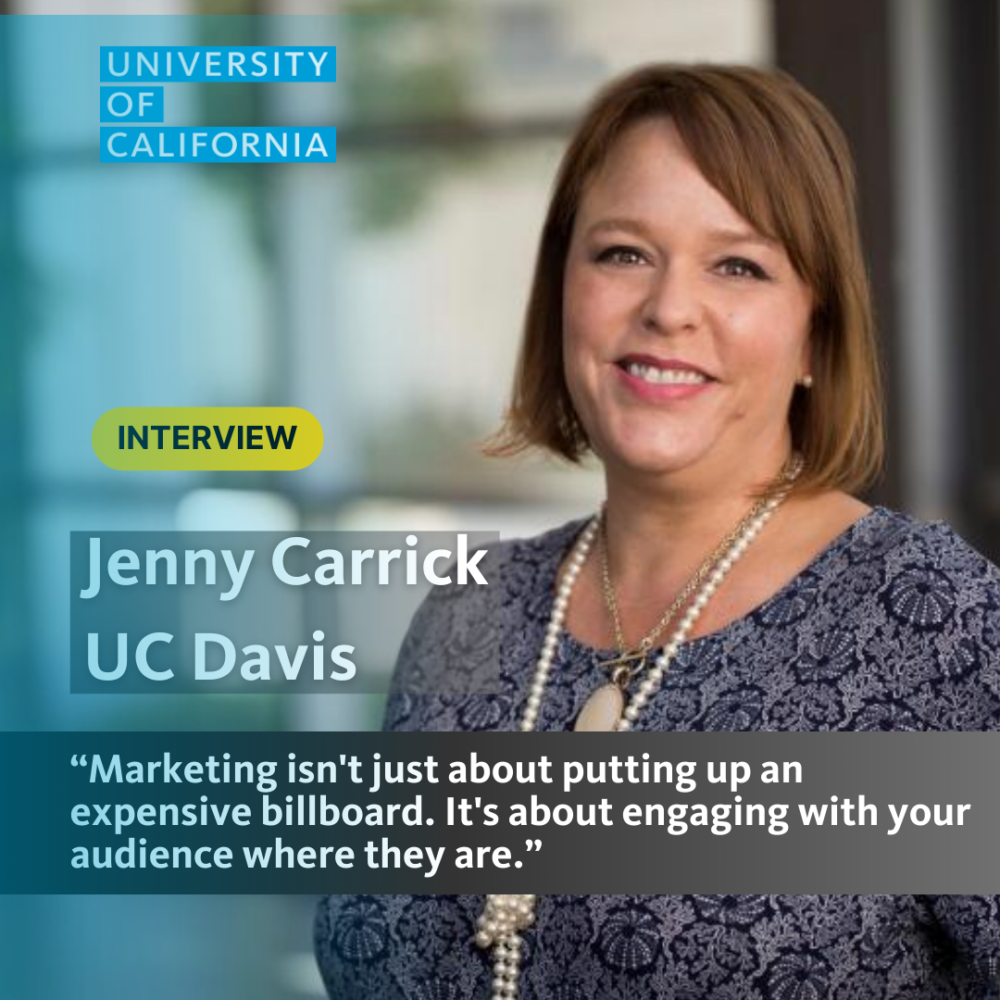In a recent interview with the UC Tech News, Jenny Carrick, marketing and communications director, Enrollment Management and Undergraduate Education, at UC Davis, and hearing loss advocate, discussed her accomplishments welcoming students via digital mechanisms while advancing digital accessibility at the UC Davis Office of Enrollment Management.
Carrick’s unique perspective as someone living with a hearing impairment
Over her career, Carrick has taken a multifaceted approach to advance digital accessibility at UC Davis. Her accomplishments include integrating cutting-edge technology into enrollment outreach, advocating that UC exceed accessibility compliance, and foster systemwide collaboration. Furthermore, as someone living with a hearing impairment, Carrick brings a unique perspective to her work promoting digital accessibility compliance. She stands on the frontlines of the UC’s grassroots movement for digital accessibility.
Crafting innovations for digital natives based on rigorous research
Carrick began her career in radio and news journalism, before pivoting to community relations work and playing a key role in the launch of the Betty Irene Moore School of Nursing at UC Davis in 2009. These professional experiences have informed Carrick’s work at the Office of Enrollment Management, where she works to make digital tools accessible to prospective students at UC Davis. These tools include a virtual tour of the UC Davis campus, tailored to the interests of the prospective student who navigates it, and chatbots that answer frequently asked questions for prospective students.
“My background in communications has been essential in crafting messages that not only resonate with our audience but also provide reassurance during times of change,” Carrick explained.
In her current position, for example, Carrick puts her journalistic background to good use by deeply researching the needs of one of her client groups: prospective undergraduate students. Carrick learned that “the digital aspect is so important for recruitment and especially for undergraduate students: Gen Z and the generation behind them. These are digital natives. They’re more diverse. They know how to use technology and they expect that those who work with them and serve them to know how to use it and how to communicate in an online, virtual world. They expect personalized marketing and digital marketing; they expect user-generated content.”
From this research, Carrick identified a need for more user-generated content: in other words, content and testimonials from former prospective students at UC Davis who now attend the school. She emphasized, “I try to recruit people, especially current students, to help us share the story of UC Davis and why students might want to go here.”
“Marketing isn’t just about putting up an expensive billboard. It’s about engaging with your audience where they are,” said Carrick.
Technology as an expectation for first-gen students
Carrick sees the implementation of digital tools like virtual tools and chatbots as a critical way to respond to her customer’s needs. “Undergraduate Education is the division that is managing and ensuring that all the undergraduate experiences are leading to student success, that we’re increasing retention, and we’re increasing graduation rates, and that we’re doing it for a diversified audience. That speaks to why this technology is so important because there are students coming into UC Davis and throughout UC who are first-gen, who have certain expectations of what their education is going to be like,” she said.
“For example,” Carrick continued, “speaking of generative AI, our Center for Educational Effectiveness recently conducted a study asking students what they expected, how they expected to see AI in their undergraduate experience, and this survey led to some great findings to understand what those students want. The center then shares that information with faculty, and it helps guide faculty in how they should bring these new technologies into the classroom.”
Setting an exceptional standard for accessibility
Beyond understanding user expectations for the UC Davis Office of Enrollment Management’s digital tools, Carrick discussed accessibility considerations as another way to broaden her impact and tailor her tools to her customer. She said, “At UC Davis, I am committed to ensuring that all our digital content is accessible to every student, including those with disabilities. As a passionate advocate for exceeding ADA compliance standards, my strategy encompasses several key areas. We provide text alternatives for non-text content to support those who use screen readers and other assistive technologies. We also focus on making sure that all our digital resources are easily navigable and understandable for users with a variety of disabilities.”
Beyond the legal requirement for accessibility compliance, Carrick’s work to advance digital accessibility supports the values of diversity and inclusion at UC Davis. From a systemwide standpoint, digital accessibility considerations support the UC-wide mission: the promise of the institution to give students equal access to educational resources and enable full participation in their educational journey.
Living with a hearing impairment – a source of inspiration for Carrick and those around her
For Carrick, accessibility is more than just a part of her job; it is a personal right and requisite. Carrick is hearing impaired and uses hearing aids and other technologies to manage her disability. She also does freelance work for a hearing aid company, where she provides them with social media content about her experiences. She stated that after discovering the value of user-generated content for her recruiting tools, “I then started to share some of my experiences with hearing aids online and in social media. This led a hearing aid company to ask me to [create] user-generated content on their behalf.”
Carrick’s ability to create partnerships in industry and find synergies, as she did with the company who provided her hearing aids in exchange for the hearing aids she wears, carries into her work as a marketer. Supporting underserved communities and finding ways to ensure their needs are met is clearly her mission. The UC Tech News team welcomes the opportunity to track marketing and technology innovations that continue to result from Carrick’s team as a result of her unique perspective and approach.
Contact

Marketing and Communications Director
Office of Enrollment Management
UC Davis

Marketing & Communications
UC Office of the President
Author

Marketing and Communications Intern
UC Office of the President

